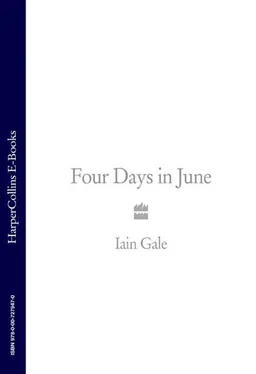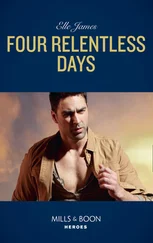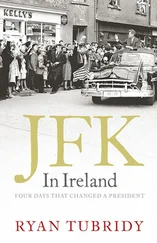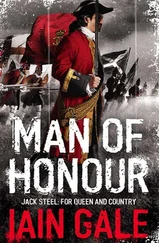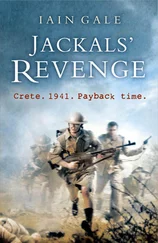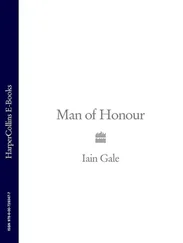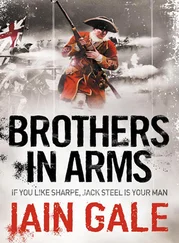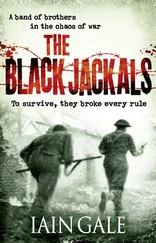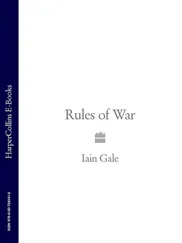1 ...8 9 10 12 13 14 ...19 ‘Dansons la carmagnole, Vive le son, vive le son Dansons le carmagnole Vive le son du canon.’
Macdonell recognized the song of the French Revolutionary Republic. No more dangerous now than a children’s rhyme. He smiled at them, then looked up at the high windows of the thin, red-brick houses which lined the street and out of which people were now leaning, straining to catch a glimpse of this moment in history which, without warning, had overtaken the drab existence of their little town. They were women mostly, of all ages and stations, shouting unintelligible flatteries, waving lace handkerchiefs or lengths of orange silk. More scraps of orange material of all sorts were pinned up all along the street – on the walls, signposts, trees. Orange. National colour of the Kingdom of the Netherlands and as close to an expression of loyalty as these people could find for the strange red-coated soldiers who had come to ‘save’ them from the little man whom some still called ‘the monster’.
Macdonell looked as if he might manage the job on his own. Blue-eyed and with a shock of wavy, fair hair, Lieutenant-Colonel James Macdonell had been a professional soldier in the army of King George for more than a score of his thirty-seven years. A soldier ever since that day in 1794, when he had left Oxford and the unsatisfying indolence of his studies to join the Highlanders.
At six foot three inches, half a foot above the average, he sat tall in the saddle, his stature increased all the more by the high, false-fronted black shako, with its gold and crimson cords, shining brass plate of the Garter Star and spotless red and white plume. At his side, in its black leather scabbard, hung a straight-bladed infantry sword – 32 inches of tempered Sheffield steel.
As he continued along the street, Macdonell’s gaze was caught by the dark eyes of a particularly pretty local girl who had come to smile at him from the balcony of a second-storey window. Out of courtesy and intrigue, he smiled back. Then, lest his men should notice, although they were some distance to the rear, he looked away. And in doing so he began to pay closer attention to the people pressing around him – their clothes the long blue smocks of farm labourers. There were women in long-eared caps and thick petticoats. Hard-featured, heavy-set, peasant stock. They had come into town, he imagined, to see the English march through. To welcome him and his men as liberators. Not since Spain had Macdonell received such a hero’s welcome. And this time he had not yet even helped win a battle. Had not yet killed a single Frenchman. They had come too, he quickly realized, with an eye to a little business. For apart from the schnapps he could now see that they had come with cheeses, sides of ham, sausages, live chickens, bread, dark-looking beer. Dangerous place for an army, he thought. He saw too that, beyond the crowd, the main street of this, the key town on the advance of the Anglo-Allied army, through which many units, he presumed, were to pass that morning, had become quite impassable, blocked with wagons – civil and military – in a tangle of transport and manpower which could only be left to the provosts and Scovell’s staff cavalry.
Macdonell turned his horse and trotted her quickly back down the street, towards the waiting head of the column, left in the charge of young Gooch. He liked the boy. One of the battalion’s more promising ensigns. He’d joined the colours three years ago, just a year after Macdonell himself had transferred into the regiment.
‘Mr Gooch. We’ll stop on the east side of the town, away from the main street. Move the men off, if you please. Down that street. Over there. Oh, and send a runner to Colonel Woodford. Tell him that the route through the town is blocked to all troops and suggest he call up the provosts.’
‘Very good, sir. Sar’nt Miller, have your men right face and double into the fields. Oh, and find me the colour sar’nt.’
‘Sir.’
Miller, five foot eight of solid muscle and solid good sense, twice Gooch’s age, turned to the ranks. Raised his voice. Changed its tone. ‘Number one section. By the right. Right turn.’ A crash of boots coming down in unison – grinding leather and hobnails on the cobbles. ‘Forward march.’
With a swinging, rhythmic action, led by Miller’s men, the two light companies of the 2nd and 3rd Regiments of His Majesty’s Foot Guards moved off the main road leading into the town of Braine-le-Comte and down the side-street which led up towards the rising ground of the surrounding fields. Macdonell and the other mounted officers went with them. Reaching the open country he gently urged his horse over a low hedge before dismounting and handing the reins to his soldier-servant, Tom Smith, who, as ever, had materialized silently at his side.
Lush country this, he thought. Very different to Spain. Villages and farms in all directions. Fields rich with crops – wheat, rye, hops. Here and there the top of a steeple, just visible over the gently undulating ground. The roads, though, were not so good. Worse in fact than the Peninsula, were that possible. Uneven surfaces and in bad repair. And now made no better by the rain which had featured on and off throughout the early morning. There was too a sense of neglect about the countryside. Of resignation to forever being in a state of disruption. A sense of a land which, over the centuries, had become accustomed to being no more than a corridor for so many armies. Not just those which had fought here these last twenty years, but the armies of Marlborough’s time and, even before then, those of the old kings of the Middle Ages. This was history-book country. Nursery names – Crécy, Oudenarde. The land was inured to the passage of men. Men on their way to die. It was a land scarred by death and, Macdonell reckoned, would long remain so.
He shivered.
‘Colour Sar’nt Biddle.’
He or Miller never seemed very far away.
‘Sir?’
‘Make sure that the men get something to eat. And that they’re fit to march.’
The men could really suffer on these roads, he thought. Of course their shoes were nothing like the sandals and rags to which some, even officers, had been reduced in Spain. And, since Brunel’s business had taken over the footwear provision, gone too were those ridiculous shoes with the clay insoles, bought in their thousands in a contract which, all knew, had been designed merely to line the pockets of those charming commissary officers at the Horse Guards. Shoes which would disintegrate with the first few drops of rain or on crossing a single stream.
Even so they had come eight, perhaps ten miles already this morning. Smith had woken him at Enghien, long before dawn, with the movement order on Braine-le-Comte. By 4 a.m. they had been en route . Macdonell counted himself fortunate. Some of the officers had managed no sleep whatsoever, having come directly from the grand ball held the previous evening in Brussels by the Duke and Duchess of Richmond. Although invited, Macdonell had chosen not to attend. Oh, he loved to dance. But his way was real dancing. Highland dancing. The dancing in which he delighted back home at Invergarry. Anyway, this was no time to be dancing. And to prove it, George Bowles had come rattling back from Brussels at 2 a.m. to join the route.
Dear George. Six years his junior. A Wiltshire squire’s son and ever the dashing, dandy captain of Number Seven Company. Macdonell caught sight of him now, riding off the road, still clad in his elaborate full dress uniform. And he knew that George was not the only officer on the march that morning dressed in muddy dancing pumps and white hose. But it had not been with the expected tales of amorous exploits that George had returned to camp. As luck would have it he had far more piquant news. He had discovered what they were to do. How they were to be engaged in the coming campaign. And before they had set off that morning he had promised Macdonell a full explanation of what had now brought them to this sodden field after five hours on the road.
Читать дальше
